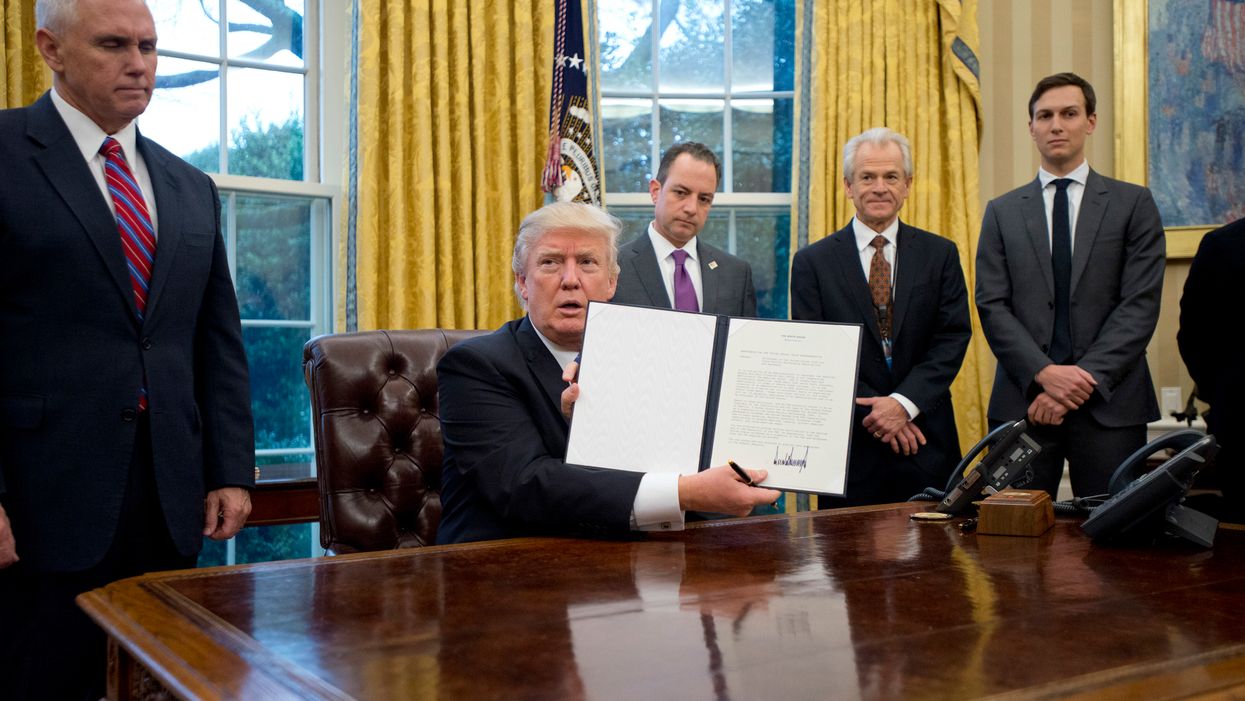Hernández is on leave this semester as an associate professor of Latina and Latino studies at Mount Holyoke College.
The Trump administration's power grab during the new coronavirus pandemic is well underway.
But even before the Covid-19 outbreak, President Trump was out-maneuvering the principal obligations of Congress — funding and providing oversight of the executive branch, and setting policy through legislation — by deploying executive orders, rule changes, fee schedules and international agreements to minimize the power of the legislative branch during his presidency.
The clearest and most calculated form of this congressional suspension can be found in immigration policy-making, seeking to change the flow of migration to this country while altering the democratic system of checks and balances.
Most dramatically, the administration has choked off the asylum process with both blunted tools, such as family separation, and refined instruments, such as the "remain in Mexico" Migrant Protection Protocols from the Department of Homeland Security and ludicrous safe third-country agreements.
On top of this has been a revolving door of "acting" directors for federal agencies, which is Trump's preference because those temporary appointments dodge the Senate confirmation process and evade existing laws for filling government vacancies. Trump buttresses his congressional end run with bombastic anti-immigrant rhetoric, inspiring violence against migrants, even telling non-white members of Congress to "go back" to where they came from.
Trump's authoritarianism, disdain for Congress and end runs around the legislative branch are on display daily, upending migration policies through both executive power and bureaucratic gamesmanship while the president avoids even proposing, much less signing, any legislation. Opening his presidency with two immigration enforcement executive orders and his versatile travel ban (targeting Muslims, then Africans and others, and now what he calls a "foreign virus"), Trump recently intensified his assault on lawful migration by instituting a "wealth test" on persons seeking entry and adjustment of status.
His pet project, the border wall, is being built with money taken from other congressional funding sources, and Trump has effectively rewritten the legislative appropriations process in order to punitively defund sanctuary cities.
The president has additional tools in the executive shed to keep Congress at bay. Besides name-calling and personal threats to adversaries, Trump has wielded pardons and even promises of pardons for supporters who commit crimes on his behalf. In addition, the running tally of false or misleading statements by the president, documented by The Washington Post , reached 16,241 (an average of 15 a day) only three years into his presidency. Such purported "alternative facts" challenge climate science, hurricane pathways and death tolls — and his own Centers for Disease Control and Prevention as the nation intensified its combat against the coronavirus.
The administration's patient and methodical diminishment of checks and balances has used existing administrative powers, and new ones invented as needed, to flout congressional authority. It is a sharp contrast to Trump's brazen policy decisions and reversals, and his plainly outrageous behavior. Who needs a Congress when you can openly defy it, even without the cover of a global pandemic, and take baby steps toward authoritarianism by legislating from the Oval Office?
Of course, Trump has had a partner in this effort. The Supreme Court is an active supporter of the president's agenda, rarely holding him in check and, more often, delivering special procedural favors and majority rulings to protect White House policies enacted through fiat, proclamations and executive orders.
In the immigration area alone, this has included permitting the administration to deny federal aid to sanctuary cities, pilfer funds from other programs for the border wall, maintain racially tinged travel bans and smother the asylum process.
Trump has meddled in the courts too, even recently demanding that Justices Ruth Bader Ginsburg and Sonia Sotomayor "recuse themselves on all ... Trump related matters!" But the conservative majority has sided with the president on most everything, benefitting "one litigant over all others," wrote Sotomayor. Trump and the high court have turned Congress into a despised middle child, dashing any illusions of a balance of coequal government branches.
With the Supreme Court firewall at the ready, the 2nd Circuit Court of Appeals recently punted on a case that effectively nullified Congress' subpoena power, ruling that when he was White House counsel Don McGahn was free to defy a congressional subpoena upon Trump's orders, potentially stifling all future investigations into the White House. Trump's rogue defiance — in fact, during the impeachment trial, Senate Republicans argued that the lack of subpoenas was evidence of an absence of due diligence by Democrats — is no longer rogue, but simply lawful.
The president and his bureaucrats have been proceeding diligently, dissolving Congress in plain sight by administrative means. This is Trump's central method for doing dirt, the supreme manifestation of his long-signaled views about authoritarianism — whether stiffing workers and contractors as a private citizen, pinning medals on his favorite extremists, pardoning friends or circumventing congressional power at every turn.
How this has shaped immigration policy is extremely important, but it's only one of so many examples.
Voters will have a say in November, we hope. But their elected representatives must start insisting on having much more of a say, before it's too late.



















Trump & Hegseth gave Mark Kelly a huge 2028 gift